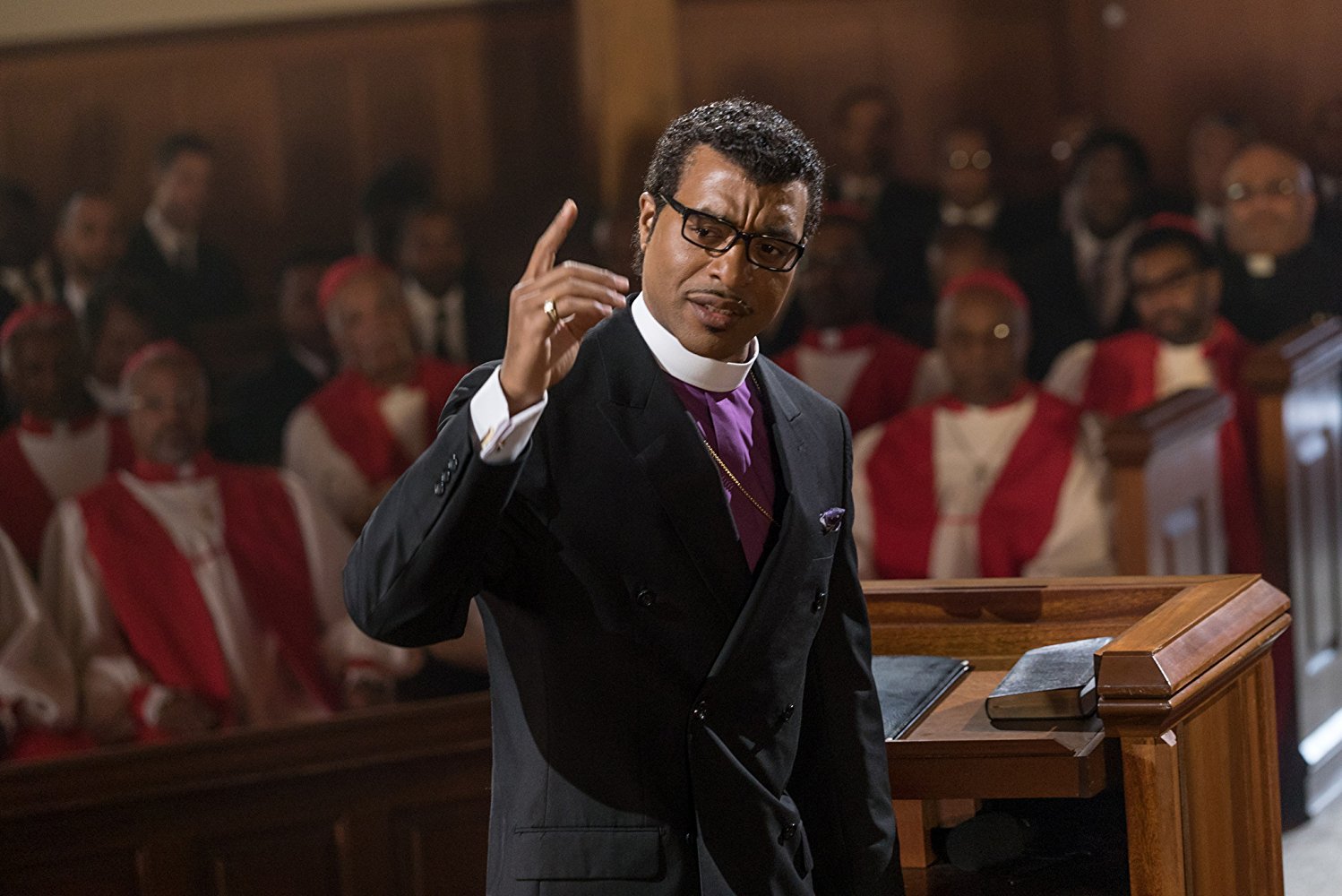
MPAA Rating: NR | Rating: ★★★½
Release year: 2018
Genre: Biography, Drama, Spiritual Director: Joshua Marston
Come Sunday is one of the better sermon-as-cinema examples, appropriately preachy although its theological doctrine might be unsound. Based on a 2005 story from This American Life, and produced by the NPR radio show, Come Sunday is a biopic about the rise and fall of Bishop Carlton Pearson (Chiwetel Ejiofor), whose theological message of universal inclusion and renouncement of hell resulted in the loss of his Tulsa, OK megachurch ministry and being given the distinction of “heretic.”
Affecting and sympathetic, Come Sunday is elevated by its strong performances, particularly Ejiofor as Pearson, who literally shines. Much of the film focuses on the behind-the-scenes machinations of church ministry: preparing for sermons or planning calendars, dealing with budget issues or practicing with the choir. As a pastor, I found these scenes to be authentic and compelling, even in the mundaneness. Pearson is surrounded by a cadre of friends and family members who love him, even if/when they can’t support his message. Pentecostal legend Oral Roberts (Martin Sheen) lovingly describes Pearson as his “black son” in ways which feel both “aw shucks” and mildly racist. Sheen portrays Roberts with a cool calmness and matter-of-fact demeanor. Henry (Jason Segal, in a surprisingly compelling performance) is Pearson’s right hand man and ministerial friend. Their friendship was far more affecting than I could have anticipated–it’s clear the two men love each other as brothers and ministry partners, and when the theological sh*t hits the fan, the relational fallout is aptly emotional without ever demonizing either character. Relationships fall apart and rifts happen, even between ministers who both claim to love Christ. Pearson’s wife, Gina (Condola Rashad) is the outsider to both the church and her own marriage, made to feel aloof even as she tries to support her husband. Yet it’s the dynamic between choir director Reggie (Lakeith Stanfield) and Pearson which is the most interesting, as the young gay man silently wrestles with his sexuality and theology alongside a compassionate but firm Pearson. When Pearson tells Reggie that practicing homosexuality is still a sin even though God will ultimately save everyone in Christ, it’s a perfectly muddled (and befuddling) message. A confused Reggie pleads with Pearson, longing for some spiritual clarity: “Then what is the message?” That Pearson doesn’t really give a sure answer is indicative of the film’s commitments. He’s absolutely certain about some things, while tossed about by the winds and waves of circumstance with others. In other words, he’s a flawed human, like anyone else.
While Come Sunday does ultimately lionize Pearson and seems to affirm his message of universalism more than critique it, Ejiofor imbues the man with a muted arrogance and self-reliance which makes for a complex protagonist. He’s charismatic (both in terms of charm and theology), a bit fussy, and certainly idealistic regarding both his God-given message and abilities. His treatment of Gina feels hierarchical, as if she’s an object for his ministry purposes rather than a person. Indeed, for all his talk of inclusion and togetherness, Pearson makes most of his big decisions in isolation, sometimes staring into the Bible for answers, but evidently being most clearly spoken to by God through TV images. Marston’s camera follows him with a quiet empathy without ever becoming sentimental. It’s an emotional film with emotive performances, but there is something aloof or distancing about the filmmaking, perhaps to aim for more objectivity rather than taking a clear side.
After being branded a heretic by a committee of bishops and having to close up his megachurch due to lack of attendance, Pearson goes to visit the dying Reggie, also isolated and ostracized as an HIV-positive gay man. Following their conversation, Pearson goes down to a river, alone, and baptizes himself with the waters. It’s a poignant, ambiguous scene. Is Pearson a prophet or merely pompous and pretentious? Is he an elevated individual, or just isolated and imperious? Should we follow people who claim they have the “right” message from God and baptize themselves outside of accountability or community? Sometimes it’s hard to discern the prophetic voices from the preachy and presumptuous ones; a wolf in sheep’s clothing is not always immediately recognizable. The film rightfully honors the complex theological, ministerial, and relational conundrums it presents. Perhaps more than anything, Come Sunday reminds me that theology matters. Asking tough theological questions and seeking truth in the context of a spiritual community is a worthy–even urgent–endeavor in our theologically-confused Western culture.
IMDB Listing: https://www.imdb.com/title/tt1690967/
Leave a Reply